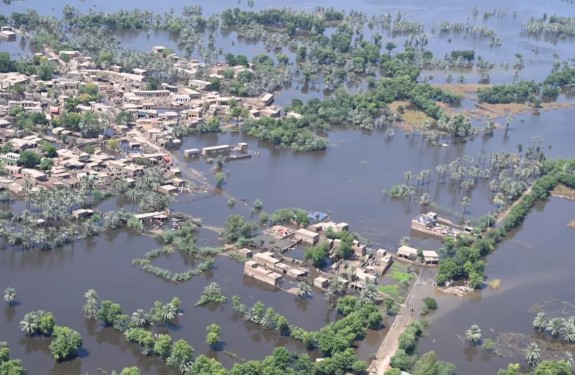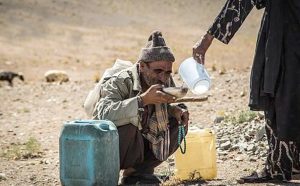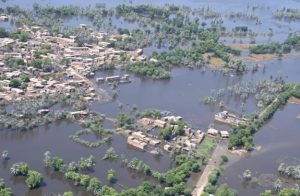
Written by: Haris Qadeer
During the ongoing monsoon season, people across Pakistan are once again facing severe flooding. As always, the state and ruling elites appear to be shirking their responsibilities.
Over the past few years, successive governments have emphasized that Pakistan contributes less than 1% to global greenhouse gas emissions, while also being among the top ten countries most vulnerable to climate-related disasters. For the past two years, Pakistan has been demanding financial support from global imperialist powers and industrialized nations to compensate for the losses caused by climate change. This month, similar demands were again echoed by Prime Minister Shehbaz Sharif and Foreign Minister Bilawal Bhutto Zardari.
It is entirely true that the root cause of the global climate crisis lies in the excessive greenhouse gas emissions, primarily from industrialized countries, especially those in the Global North. It is also true that Pakistan’s contribution to these emissions is under 1%, approximately 0.8%. It is also true that Pakistan is among the countries most severely affected by the climate crisis. Therefore, the demand for international compensation funds is both fair and necessary.
However, this is only half the truth.
The destruction caused by extreme weather in Pakistan is not solely due to the global climate crisis. A major share of the blame also lies with the incompetence of Pakistan’s rulers, the failure of state institutions, and the policies of feudal lords, capitalists, landlords, and powerful institutions who continue to prioritize their interests over public safety and environmental sustainability.
Unplanned Development and Environmental Devastation
Large dams, highways, housing schemes, and industries continue to be built without any environmental impact assessments. Urban sprawl remains unchecked, and deforestation persists without pause. The institutions responsible for environmental protection remain weak, underfunded, and largely inactive.
Despite official commitments to reduce carbon emissions, there has been no budget allocation, no strategic planning, and no genuine political will to meet these targets.
In major cities like Lahore, Karachi, and Faisalabad, air pollution has reached hazardous levels. These cities consistently rank among the most polluted in the world. The illegal encroachment on riverbeds, blockage of natural drainage routes, and unregulated construction are among the major reasons behind the intensification of floods and their devastating impacts.
Pakistan’s forest cover is only around 5%, while the global average is approximately 30%. Reforestation and environmental justice programs have been undermined by corruption, poor monitoring, and exploitation for political publicity. Overall, it is clear that the state and the ruling elite have pursued a development model that disregards environmental balance, and the burden of this recklessness falls squarely on the working poor.
Across the country, housing societies continue to expand rapidly. In the process, forests and farmlands are being grabbed, natural waterways are being blocked, and illegal structures are being erected. These actions have made the region increasingly vulnerable to climate-related disasters. Even today, rural and peri-urban areas surrounding elite housing societies such as DHA and Bahria Town in the capital city are submerged in water. This flooding is a direct consequence of these societies occupying the natural drainage paths during their construction.
Housing Expansion at the Cost of Forests and Farmlands
According to a report published in Dawn, nearly 700,000 acres of forest land across Pakistan are under illegal occupation, much of it repurposed for housing and commercial projects.
In Punjab alone, between 1990 and 2022, over 630,776 kanals of agricultural land were converted into housing societies, leading to a nearly 14% reduction in cultivable land. In just one example, DHA Multan cleared 6,000 acres of land and cut down more than 500,000 mango trees to establish a housing colony.
In Lahore, approximately 70% of agricultural land has been converted into housing schemes. In Faisalabad, 30% of arable land has vanished. Between 2013 and 2023, in Peshawar, about 302,894 hectares of agricultural land became uncultivable — 70% of it is now under illegal housing societies. Out of a total of 198 housing societies in Peshawar, 162 are illegal. Similarly, in Charsadda, around 60,000 kanals of farmland have been lost to housing developments.
Major real estate giants like DHA and Bahria Town have been among the most destructive forces against forests, farmlands, and natural watercourses. Land records reveal that these two societies alone have encroached upon more than 600 acres of forest land in the Takht Pari area of Rawalpindi, converting it into residential plots.
Similar patterns of illegal expansion are evident in various cities across Punjab, Sindh, and Khyber Pakhtunkhwa, where housing societies have encroached upon forest land. In Haripur Division, 39 acres of forest land have been unlawfully occupied and deforested for private housing projects. Unchecked deforestation is also rampant in mountainous regions.
Additionally, the haphazard expansion of urban and rural settlements has blocked natural drainage paths, significantly increasing the scale and damage of monsoon-related floods.
The Hypocrisy of Climate Advocacy and the Failure of Local Governance
While our rulers continue to make performative and often hypocritical statements on the global stage about compensation for climate damages, they remain entirely unwilling to address their failures at home. In reality, if serious efforts were made at the local level to protect the environment, the impact of climate-related disasters could be significantly reduced.
Air pollution in urban centers could be mitigated. Forest cover could be expanded by putting an end to indiscriminate deforestation. Such steps could drastically reduce overall environmental degradation.
However, these rulers and the system they represent lack both the capacity and the political will to protect the population from the harms of environmental pollution. The same leadership that begs for climate reparations on global platforms is actively enabling or deliberately ignoring destructive environmental practices within the country. They preside over or protect the very development models and policies that continue to destroy ecosystems, displace communities, and deepen the climate crisis at home.
Courtesy: Daily Jeddojehad, Lahore




